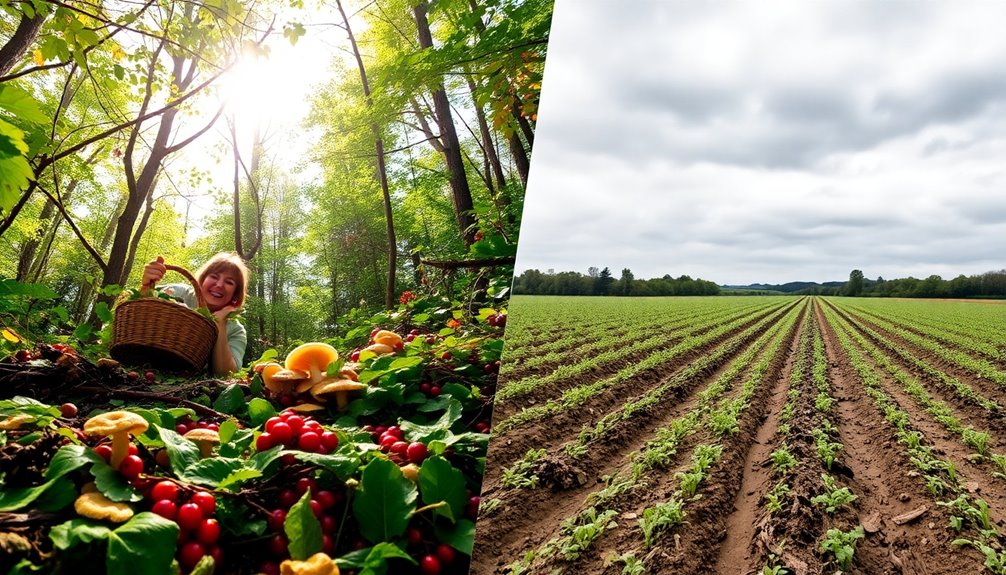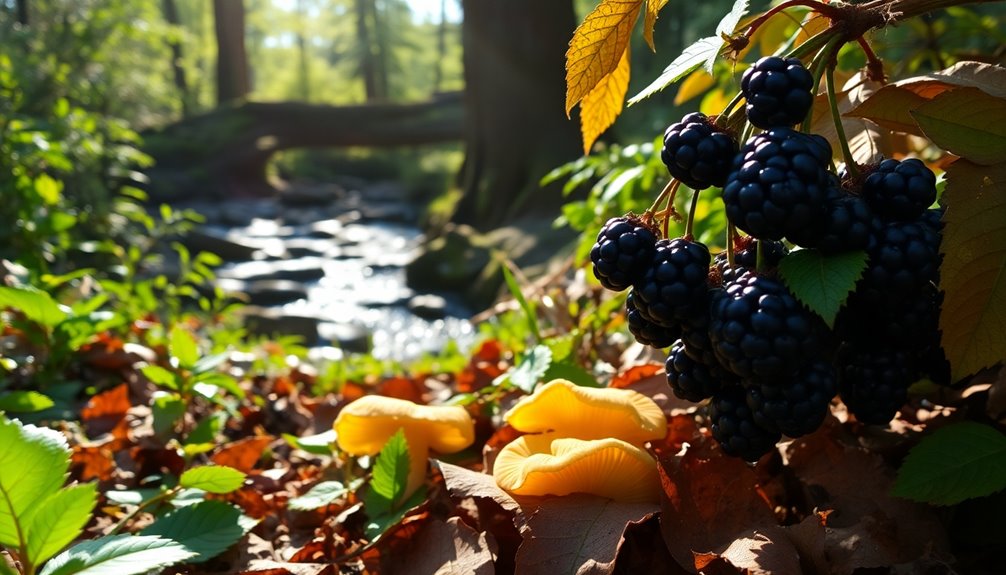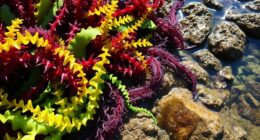Foraging is often better than farming for several shocking reasons. You gain access to nutrient-rich wild foods that surpass supermarket offerings. Plus, foraging promotes mental well-being by immersing you in nature, reducing stress and boosting happiness. Unlike farming, it fosters community connections and environmental sustainability, helping preserve biodiversity while lowering your carbon footprint. Foraged foods introduce unique flavors and culinary experiences, enhancing your meals. In contrast, farming can create rigid social structures and nutritional pitfalls. The benefits stretch beyond just food—discover how foraging can transform your life and expand your culinary adventures!
Key Takeaways
- Foraging promotes egalitarian communities by sharing resources and knowledge, reducing social inequalities compared to rigid farming structures.
- Nutritionally, foraged foods are often richer in vitamins, minerals, and antioxidants than cultivated crops, enhancing overall health.
- Spending time foraging in nature boosts mental well-being, reduces stress, and fosters community connections.
- Foraging supports environmental sustainability by reducing carbon footprints and promoting biodiversity through responsible harvesting practices.
- Unique wild flavors and seasonal diversity in foraged foods enrich culinary experiences and encourage creativity in meal preparation.
Historical Context of Foraging
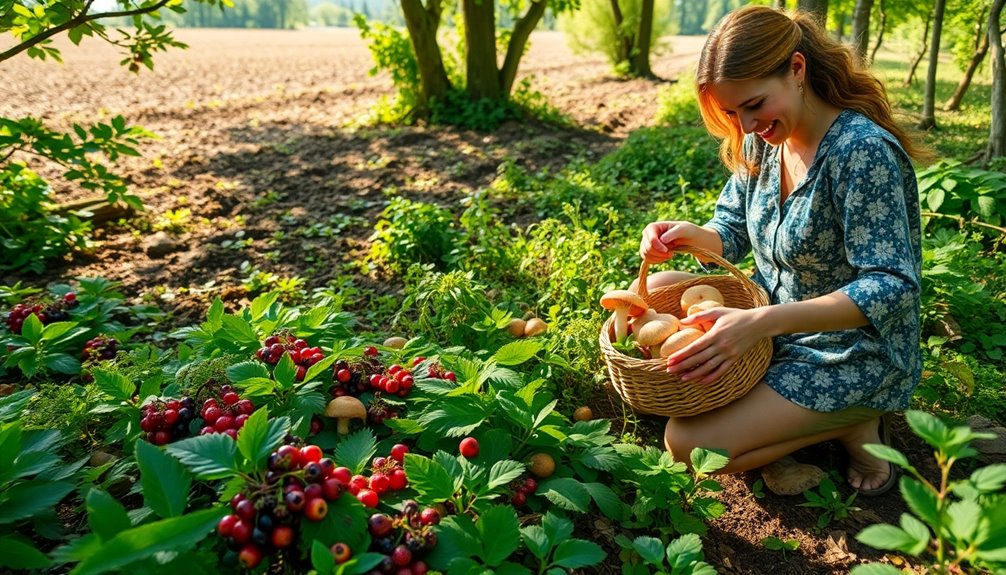
Historically, foraging played a crucial role in shaping human societies, as it was the dominant mode of subsistence for tens of thousands of years. This lifestyle thrived until the shift to farming, which occurred around 12,000 years ago during the Agricultural Revolution.
While early farming practices emerged from accidental discoveries made during foraging, they marked a significant alteration in how people lived and interacted with their environment.
You might be surprised to learn that foraging societies generally maintained healthier diets. They enjoyed a diverse array of foods, unlike early farmers who relied heavily on staple crops like wheat. This dependence often led to malnutrition and various diseases, contrasting sharply with the robust health of foragers.
Moreover, the shift to agriculture brought social inequalities and increased labor demands. The relative ease of foraging became a thing of the past, as farming required more effort and time.
Although the romanticized view of foraging often overlooks its own challenges, such as harsh living conditions and high mortality rates, it's clear that foraging provided a more balanced and sustainable way of life compared to the burdens of early farming.
Health Benefits of Foraging
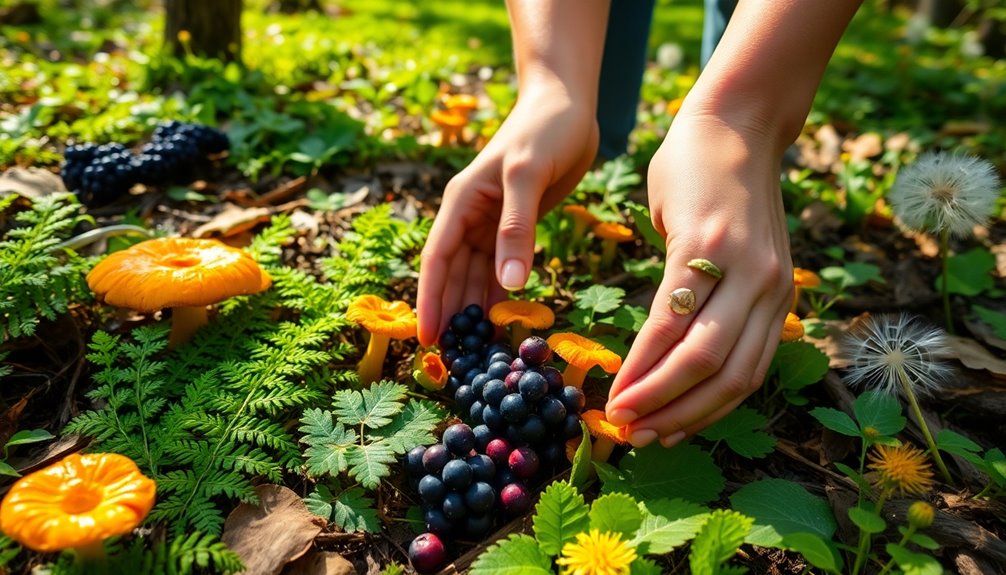
Foraging offers significant health benefits that you won't want to overlook.
Not only do wild foods pack a nutritional punch, often outshining supermarket options, but spending time in nature can also boost your mental well-being.
Engaging in foraging activities helps reduce stress and promotes overall physical and cognitive health.
Nutrient Density Advantages
Often overlooked, wild foods like nettles and dandelions pack a nutritional punch that's hard to match with cultivated crops. These foraged treasures often boast higher nutrient density, offering an abundance of vitamins, minerals, and antioxidants essential for your health. Additionally, many wild foods, such as beet juice, are known for their rich antioxidant content, which can further enhance your overall health. For instance, the power of the mighty forage harvester can be compared to the efficiency of wild foods in providing essential nutrients with minimal processing.
Incorporating wild foods into your diet can also introduce beneficial compounds like phytonutrients, which are vital for promoting overall wellness. By incorporating wild foods into your diet, you can enhance gut health and promote a varied diet, which aligns with nature's seasonal cycles. Foraging encourages you to consume fresh, local produce, typically richer in nutrients than imported supermarket alternatives that may lose their value over time. This connection to the seasons not only supports your well-being but also fosters sustainable eating practices. By reducing reliance on industrial agriculture, you're contributing to biodiversity and a healthier ecosystem. Furthermore, foraged foods such as rapeseed honey can provide additional health benefits, enriching your diet with natural vitamins and minerals.
Moreover, the act of foraging itself promotes physical activity, which is linked to improved overall health. As you explore nature in search of these nutrient-dense wild foods, you're also engaging in a form of exercise that can lead to reduced stress and better health outcomes. Additionally, incorporating wild foods into your diet may offer higher antioxidant levels that can further enhance your overall health.
Mental Health Benefits
Engaging with nature through foraging offers considerable mental health benefits that complement its nutritional advantages. Studies show that spending time in green spaces while foraging can lower your stress levels, considerably reducing symptoms of depression and anxiety. You might find that immersing yourself in natural environments not only calms your mind but also sharpens your cognitive abilities, especially if you have attention deficit concerns. Additionally, foraging can provide a sense of companionship and community, similar to the benefits seen in pet therapy for patients with dementia and Parkinson's. Research indicates that listening to classical music during outdoor activities can enhance focus and concentration, further enriching the foraging experience. Furthermore, the inhalation of essential oils from plants encountered while foraging can promote relaxation and reduce anxiety levels. Engaging in nature-based activities can also cultivate emotional resilience that protects against the effects of toxic relationships.
For adults, participating in nature-based activities like foraging promotes cognitive gains, enhancing your mental agility and emotional resilience. Foraging encourages physical activity, which, combined with the mindfulness it fosters, leads to improved emotional well-being and healthier interactions with the environment.
The sensory experiences you encounter while foraging—the vibrant colors, soothing sounds, and fresh scents—can elevate your mood and contribute to a more positive mental state. Engaging in activities that promote high vibrational energy can further enhance your overall mental wellness.
The act of connecting with nature encourages a sense of purpose and fulfillment, helping you cultivate a deeper appreciation for the world around you. So, whether you're picking wild herbs or searching for mushrooms, remember that foraging isn't just about food; it's a pathway to your mental wellness.
Nutritional Advantages of Wild Foods
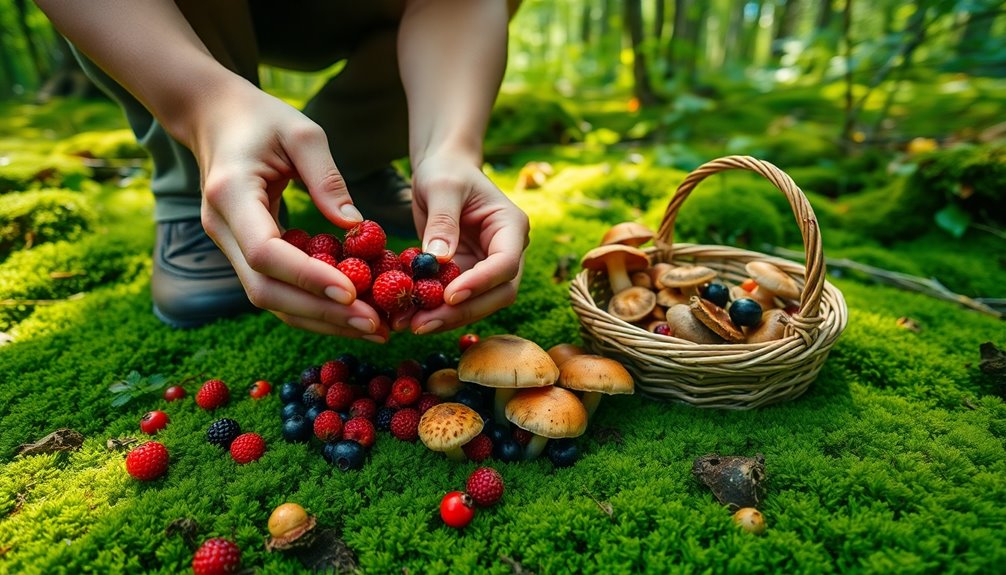
When you compare wild foods to their cultivated counterparts, you'll often find they're packed with more nutrients, offering greater health benefits.
Foraged foods also bring unique flavors and textures to your meals, making them not just nutritious but exciting to eat.
Plus, eating seasonally through foraging helps you align your diet with nature, enhancing your overall well-being.
Nutrient Density Comparison
For many, the allure of foraging lies in the remarkable nutrient density of wild foods compared to their farmed counterparts. Wild foods, like nettles and dandelions, often pack a powerful nutritional punch, offering higher levels of essential vitamins, minerals, and antioxidants.
When you choose foraged foods, you're not just enjoying unique flavors; you're also fueling your body with nutrients that support overall health.
Seasonal foraging connects you to the natural dietary cycles, encouraging you to consume foods that align with local ecosystem health. This practice enhances your appreciation for the local flora and increases your knowledge about edible plants.
Plus, the nutrient density of wild foods can lead to specific health benefits, such as improved cognitive function and reduced symptoms of depression and anxiety. Additionally, foraged foods may offer higher fiber content that supports digestive health, contributing to your overall well-being.
Unique Flavor Profiles
Amid the vibrant world of wild foods, unique flavor profiles await your discovery. When you venture into foraging, you reveal a treasure trove of tastes that cultivated farming simply can't match. Imagine savoring the earthy richness of wild mushrooms or the peppery bite of dandelion greens.
These unique flavors not only elevate your meals but also encourage you to diversify your diet, enhancing your culinary experiences. Additionally, engaging with educational toys in the form of cooking sets can inspire creativity in the kitchen, just as foraging inspires a connection to nature. Herbal teas, for example, offer a variety of unique flavors that can complement your foraged dishes.
Wild foods often boast higher nutrient density, providing a wealth of vitamins, minerals, and antioxidants essential for your health. As you enjoy these diverse tastes, you're also supporting your gut health with the prebiotics and probiotics found naturally in these foods. Additionally, incorporating foods rich in omega-3 fatty acids can further boost your overall well-being. Furthermore, many wild plants are high in antioxidants, which help reduce inflammation and support overall health.
This connection to nature fosters an appreciation for the cycles of the ecosystem, allowing you to consume ingredients at their peak freshness, which maximizes their nutritional value. Herbal teas, often used for their calming effects, can also enhance your overall wellness journey alongside your foraged meals.
While farming seems to dominate food production, foraging offers a sustainable alternative that promotes biodiversity and environmental stewardship. By choosing wild foods, you're not just indulging in unique flavors; you're also making a conscious choice to engage with local ecosystems and prioritize your health.
Seasonal Eating Benefits
During the changing seasons, embracing seasonal eating through foraging offers remarkable nutritional advantages. You'll discover that wild foods are often nutritionally denser than cultivated alternatives, packed with higher levels of vitamins, minerals, and antioxidants that support your overall health. For example, many wild greens provide essential vitamins that are crucial during pregnancy. Additionally, foragers can benefit from masterful weaving techniques to create baskets that enhance their foraging experience. This practice of foraging also promotes biodiversity conservation, as it encourages awareness of local ecosystems and their importance.
By engaging in foraging practices, you foster an appreciation for nature's cycles and enjoy fresh, local, and diverse food sources.
Seasonal eating not only aligns your diet with natural cycles but also guarantees you benefit from peak nutrient availability throughout the year. For example, when you forage for wild foods like nettles and dandelions, you're not just consuming accessible superfoods; you're also enhancing your gut health.
The varied flavors and textures of these wild foods promote dietary diversity, which is essential for a balanced diet. Additionally, foragers can discover a wealth of options such as wild leeks and berries, which are often more flavorful than their farmed counterparts.
As you explore different seasons, you'll realize that foraging provides an opportunity to connect with nature while reaping significant nutritional benefits. This sustainable practice encourages you to appreciate the rich bounty of your surroundings, making seasonal eating through foraging a rewarding choice for both your health and the environment.
Environmental Sustainability of Foraging

The practice of foraging offers a remarkable avenue for environmental sustainability. When you choose foraged foods, you notably lower your carbon footprint compared to items from the supermarket. These wild foods grow naturally, requiring no pesticides or intensive agricultural practices.
By engaging in foraging, you actively foster biodiversity and support ecosystem health. You promote the conservation of native species while encouraging sustainable harvesting practices that protect plant communities.
Foraging also cultivates a deeper connection to the Earth. It inspires stewardship and a sense of responsibility towards environmental conservation.
As you learn about responsible foraging techniques, you guarantee that wild food sources remain viable for future generations. This education is key: it empowers you to practice sustainable consumption that reduces reliance on industrial agriculture and its associated environmental impacts.
Social Dynamics and Community Impact
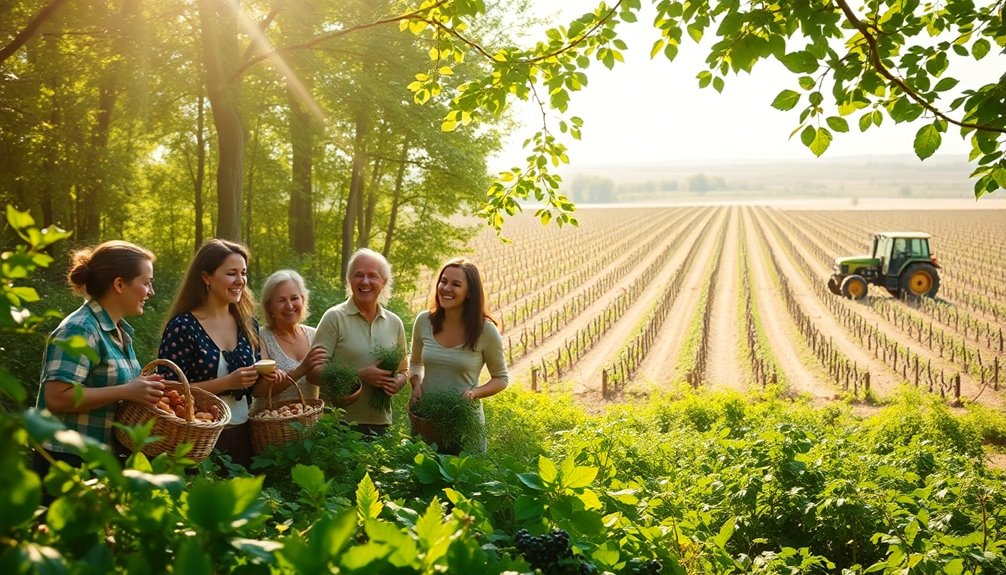
Embracing foraging as a way of life fosters strong social dynamics and enhances community impact. Unlike farming, which often leads to social inequalities and class divisions, foraging encourages smaller, egalitarian communities. You'll find that foraging promotes social cohesion as individuals share knowledge and resources, creating a sense of belonging.
Additionally, foraging deepens your connection to the land, inspiring stewardship and respect for natural resources. This connection enhances community engagement in conservation efforts, leading to healthier ecosystems. Studies show that those engaged in foraging experience lower stress and greater happiness, thanks to their active lifestyles and supportive social structures.
Here's a quick look at the benefits of foraging on social dynamics:
| Aspect | Foraging Benefits | Farming Drawbacks |
|---|---|---|
| Social Structure | Egalitarian communities | Class divisions |
| Community Connection | Stronger social cohesion | Weaker ties |
| Engagement | Active participation in conservation | Passive lifestyle |
| Adaptability | Flexible food sources | Vulnerable to crop failures |
Economic Aspects of Foraging
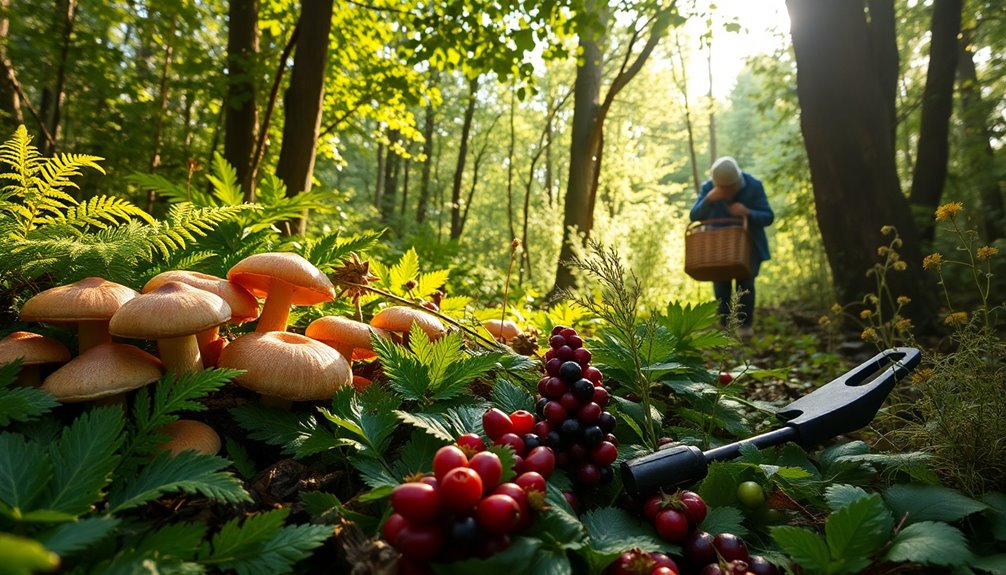
Foraging offers not just social benefits but also significant economic opportunities. When you gather foraged products, you're tapping into a market that values authenticity and quality—items like acorn flour can sell for around $25 per pound! This premium pricing highlights the economic potential of wild foods. Additionally, the growing interest in foraging can create a demand for charitable contributions that support local initiatives and conservation efforts.
Local foraging initiatives stimulate community economies by promoting the sale of these goods, allowing small businesses to thrive in artisanal food markets. By shifting focus from mass-produced items to foraged products, you're not just supporting local economies; you're also encouraging consumers to invest in sustainable practices that foster biodiversity and resilience. Emergency preparedness is essential as foraged foods can also serve as a crucial resource in times of crisis. Furthermore, foraged ingredients, such as herbal alternatives, can be incorporated into local products that promote health and wellness.
Workshops and education on wild foods further enhance local economic development. They deepen your connection to the environment while providing skills that can lead to new business ventures. Moreover, foraged items often feature high-quality protein sources, making them not only economically viable but also nutritionally beneficial.
As more people embrace foraging, reliance on industrial agriculture diminishes, paving the way for community-based food systems that prioritize sustainability.
In essence, foraging can rejuvenate local economies, making them more resilient and environmentally conscious. By engaging in foraging, you're contributing to a sustainable future and reaping the economic rewards that come with it.
Educational Opportunities in Foraging
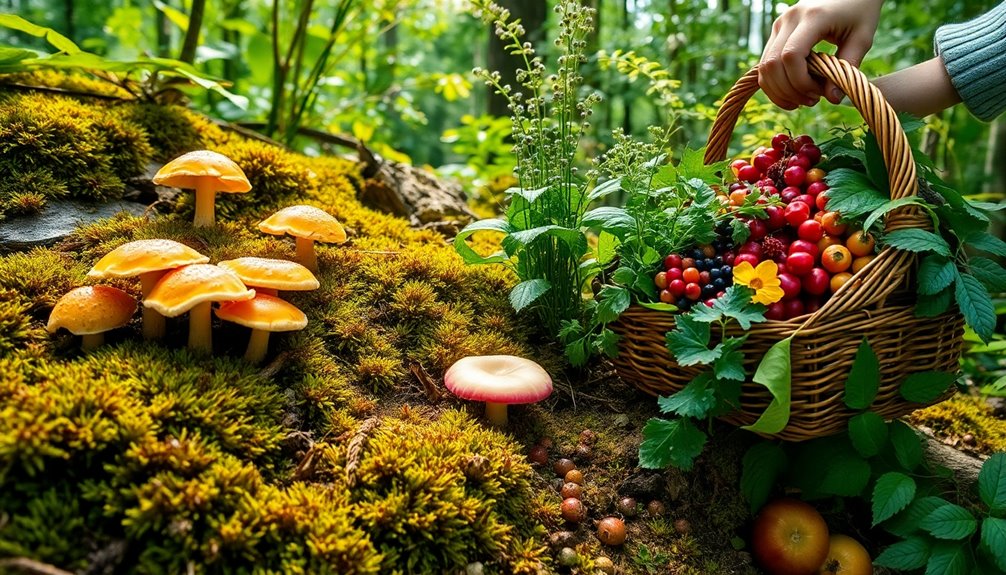
Many people are discovering the educational opportunities that foraging offers, from hands-on courses to community workshops. These foraging courses teach you sustainable harvesting practices, helping you connect with local ecosystems and appreciate biodiversity. You'll learn to identify edible plants, mushrooms, and herbs while gaining insight into their nutritional benefits.
Community workshops enhance your knowledge of native flora and promote mindfulness and slow living. Engaging in these activities not only enriches your understanding but also fosters social interaction and collaboration in conservation efforts. You'll meet like-minded individuals who share your passion for nature and sustainability.
Educational programs focused on foraging emphasize ethical practices, ensuring you grasp the importance of sustainable harvesting. By participating, you develop a deeper awareness of local flora and a sense of responsibility toward protecting plant communities and ecosystems.
As you immerse yourself in foraging education, you'll appreciate your natural surroundings in new ways. You'll also become an advocate for preserving our environment, making a positive impact on your community.
Expert Opinions on Foraging vs. Farming

How do experts view the change from foraging to farming? Many scholars present a nuanced picture, suggesting that early farming wasn't necessarily a leap forward. Archaeology professor Brian Fagan emphasizes the role of social dynamics in adopting agriculture, indicating that it often yielded less food than foraging. Samuel Bowles' studies also reveal primitive farming conditions frequently led to malnutrition and health issues, raising questions about the benefits of this change to farming practices.
| Aspect | Foraging | Farming |
|---|---|---|
| Food Production | Nutrient-dense diets | Often less productive |
| Health Impacts | Generally healthier | Increased malnutrition |
| Social Structures | Flexible and adaptive | Rigid and hierarchical |
| Resource Scarcity | Adaptation strategies | Potential for conflict |
| Historical View | Complex and challenging | Romanticized yet problematic |
Critics argue that the romanticized view of foraging overlooks its hardships, like infanticide during resource scarcity. As the debate evolves, experts continue to question whether the agricultural revolution was a necessary evolution or a misstep in human history.
Frequently Asked Questions
Why Was Foraging Better Than Farming?
Foraging's often better than farming because it offers a diverse, nutrient-rich diet that supports your health.
You get to enjoy seasonal foods that promote biodiversity, keeping your meals interesting and fresh.
Plus, foraging encourages physical activity and reduces stress, connecting you to nature in a meaningful way.
With a lower carbon footprint, you're also contributing to environmental sustainability.
What Are Some Hypotheses for Why Humans Stopped Foraging and Started Farming?
Ever wondered why your ancestors traded their nomadic lifestyle for the grind of farming? One hypothesis suggests that climate changes made foraging less reliable, pushing you toward more stable food sources.
Another idea hints at population growth; as communities expanded, the need for a consistent food supply became pressing.
Plus, cultivating grains offered a sense of security, despite the labor involved.
These factors combined to create a pivotal shift in human history.
What Are the Advantages of Foraging?
Foraging offers several advantages that you might find appealing. It provides access to wild foods that are often more nutritious than their cultivated counterparts, boosting your overall health.
You'll enjoy physical activity while connecting with nature, which can lower stress and improve your mood. Plus, foraged foods usually have a smaller carbon footprint, supporting environmental sustainability.
Engaging in foraging also encourages seasonal eating, helping you appreciate the rhythms of nature and support local biodiversity.
What Caused Some Humans to Shift From Foraging to Farming and What Were the Effects of This Change?
You might wonder what caused humans to shift from foraging to farming. This change largely happened due to the accidental discovery of cultivating grains around 12,000 years ago.
As people settled, they realized farming provided more reliable food sources. However, this shift led to limited diets and increased malnutrition, as agriculture focused on staple crops.
Social dynamics, like population growth, also played a role in making sedentary lifestyles more appealing and necessary.
Conclusion
So, you might think farming is safer and more reliable, but consider this: foraging connects you to nature in a way that farming often can't. It offers a diverse array of wild foods that are richer in nutrients and flavor, while promoting environmental sustainability. By embracing foraging, you not only nourish your body but also support your community and the planet. Ready to explore the wild side of your plate? It's time to ditch the plow and pick up foraging!

